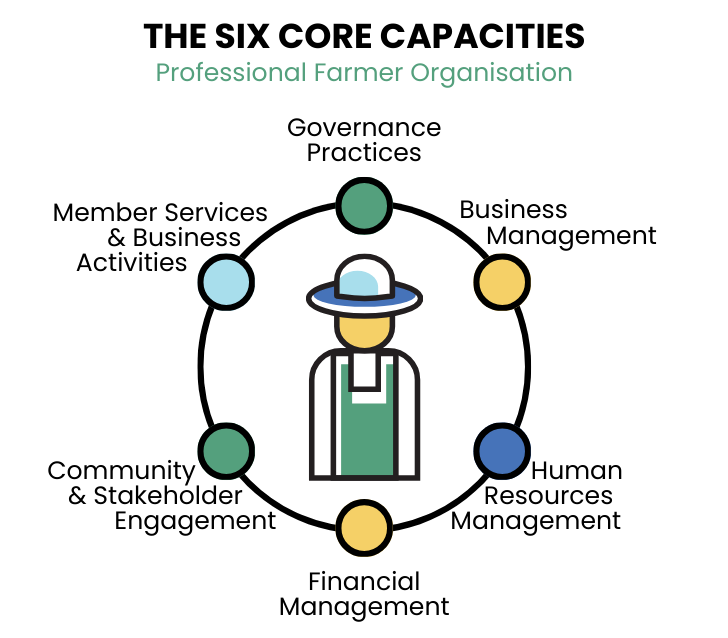The AMEA Toolbox is a curated set of peer-reviewed assessment tools and learning/coaching curricula designed to strengthen the professionalism and performance of Agri-SMEs and farmer organizations. Developed and maintained by AMEA members and partners, the Toolbox aligns with ISO 18716 key performance areas and standards, enabling ecosystem actors to work from a shared definition of professionalism. Each tool addresses specific capacities, allowing implementers to select, adapt, and combine them according to their program needs.

ISO 18716 creates a common language by providing detailed guidance on the six key performance areas a professional Agri-SME is expected to have. This Standard is intended to be used by various ecosystem partners. For more information go to https://amea-global.com/
AMEA’s Toolbox contains assessment tools and learning/coaching curricula which address various aspects of ISO 18716, depending on the business need. In the following section we provide an insight into what these tools can do and how they can be used together. This enables the AMEA Toolbox to deliver practical, results-oriented support that drives measurable improvement across diverse contexts.
We call on all people involved in inclusive agribusiness projects to use tools that have a track record and to invest in their development. AMEA members can access these tools and have the opportunity to:
The Toolbox is peer reviewed every two years. Currently, these are the approved training and coaching materials, as well as the assessment tools:
Agribusiness Leadership Program (ALP)
ABC Training & Coaching
LINK Methodology
AMEA also scans regularly to consider tools that could be complementary to the Toolbox. AMEA also invests in the improvement of these tools as explained in this Report. The tools listed below are therefore open to members for testing.
As these are newly developed tools and have not been tried and tested in various contexts and countries yet, AMEA has not peer reviewed them. As such, they might only join the AMEA Toolbox in the next peer review process, in 2024.
Pilot assessment tools to enable rural Savings and Credit Cooperative Organisations (SACCOs) to monitor and assess their performance and capacities.
SCOPE Rapid is a quick way to get basic information about agribusiness. Because it provides a glimpse, the data can be collected in one and a half hours. In addition, the data is collected by data collectors, who do not need to become certified assessors.
The Diagnostic and Monitoring of Organizations’ Capacity (DMOC) toolkit was developed to conduct various types of organizational capacity evaluations/assessments and, based on each organization’s evaluation, develop an action plan, which can be monitored by the organization itself and capacity strengthening advisor or coach.
The Women’s Inclusion, Empowerment and Leadership in Cooperatives (WIELCOOP) is a collection of tools that can be selectively used by trainers to better integrate gender and address women’s empowerment in cooperatives and producer organizations. This is a blended learning approach using handouts, digital presentations and videos. Available in French, Spanish, and Swahili.
A food safety costing tool to help farmer organisations meet international market standards for food safety, sanitation and hygiene practices. Available in Spanish, English, and French. The tool was developed based on the White Paper developed by Corus International to enable a common understanding of the food safety challenge facing Farmer Organizations.
Segmenting agri-SMEs helps match them with the most appropriate BDS/TA support and foster a self-sustaining market – system that drives sector-wide improvements that can be scaled.
We use cookies on our website to give you the most relevant experience by remembering your preferences and repeat visits. By clicking “Accept All”, you consent to the use of ALL the cookies. However, you may visit "Cookie Settings" to provide a controlled consent.